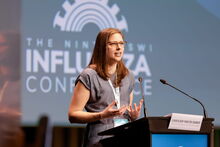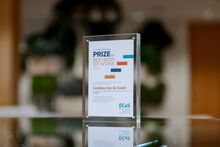Meet the winner of the Claude Hannoun prize for Best Body of Work: Carolien van de Sandt
Who are you?
I’m Carolien van de Sandt a Senior Research Fellow at the University of Melbourne at the Peter Doherty Institute for Infection & Immunity working in the field of viral immunology.
What is your educational background?
I studied Biomedical Sciences at the University of Leiden where I developed a great interest in virology and immunology. In 2016, I completed my PhD at the Erasmus University in Rotterdam, the Netherlands, in the laboratory of Prof Rimmelzwaan and Prof Osterhaus, where I investigated the longevity, cross-reactivity and immune evasion strategies of influenza-specific CD8+ T-cells.
What is your current area of research focus?
For as long as I can remember, I have been intrigued by the fact that the same virus can result in mild infections in one person and have devastating outcomes in someone else. This was something that was particular apparent during the devastating influenza pandemic of 1918 where children were less likely to be clinically compromised by severe influenza infections. However, more recently, children were also less affected by the current SARS-CoV-2 pandemic. As of 2018 I joined the laboratory of Prof Kedzierska, where I lead the Aging Immunity Research Program which aims to unravel the mechanisms that underly gain-and-loss-of virus-specific CD8+ T-cell function across human lifespan. Ultimately I wish to identify novel druggable targets that will help us restore immune functions in immune impaired populations, like the elderly.
How do you foresee your respective awards contributing to your further development?
The Best Body of Work Award and the scientists who received it before me have always been a huge inspiration. The Award comes at a crucial stage of my career, as I am establishing my own independent Research Program. The Award will help increase the visibility of my research and is a great encouragement to continue to pursue my research interests.
What do you perceive as some of the main challenges early career scientists must/need to overcome?
I think each scientist has their own challenges to overcome, from finding your own nice area in a highly competitive field to finding supportive mentors and a healthy work-life balance. However the biggest challenge to-date for early career scientists would be to find enough funding to support their research and their scientific ambitions. I think what is important, and this sounds very cliche, is that with whatever hurdle you face you just do not give up. You pick yourself up and try again, even if this means moving to a new laboratory, moving overseas, finding a new research direction or write another research fellowship/grant application. For every successful grant/fellowship people have received there are often many attempts that did not make it. However, those failed attempt were often crucial to further shape and improve applications that were ultimately successful.
In your opinion, how do international conferences like ESWI benefit early career scientists?
I have attended the ESWI and other conferences since the start of my PhD. They have always been a great opportunity to disseminate our findings to a broad international audience and provided great network opportunities to exchange ideas and knowledge with other scientists in the field, as well as attending inspiring talks of senior keynote speakers. The ESWI conference is unique in that they organize the special Young Scientist Network Events. This informal event has proven to be a great way to meet other young scientists in the field and often offer an opportunity to speak to some of the keynote speakers from the conference. I have met many scientist from all over the world on these events and we often catch up during other conferences. The young scientist events greatly helped me build my network.

Dr Carolien van de Sandt is a Senior Research Fellow in the Department of Microbiology and Immunology at the Peter Doherty Institute, University of Melbourne (UoM). Her principal area of expertise is in viral and aging immunology.
Carolien completed her PhD in 2016 at the Erasmus University in Rotterdam (Netherlands) where she investigated the longevity, cross-reactivity and immune evasion strategies of influenza-specific CD8 + T- cells, followed by two years of postdoctoral research in the laboratory of Profs Rimmelzwaan and Osterhaus.
In 2018, she was awarded the prestigious European Marie Sklodowska-Curie Action (MSCA) Fellowship and the University of Melbourne’s McKenzie Fellowship to join the Kedzierska laboratory, where she leads the Aging Immunity Research Program which aims to unravel the mechanisms that underly gain- and-loss- of CD8 + T-cell function across human lifespan.
During the pandemic Carolien temporarily relocated to the Netherlands as part of her MSCA fellowship (2020-2021) where she led her own research team at Sanquin Research studying SARS-CoV-2 immunity in healthy and autoimmune patients. In 2022 she was awarded the ARC-DECRA fellowship to continue her Aging Immunity and T-cell Development Research at the University of Melbourne.
Carolien has >50 publications including in leading scientific journals like Nature Medicine, Immunity, Nature Immunology and Nature Communications. The importance of her work has been recognized by 16 Awards including the Viruses Early Career Investigator Award.
- Age and Latent Cytomegalovirus Infection Do Not Affect the Magnitude of De Novo SARS-CoV-2-Specific CD8+ T Cell Responses
- Flu vaccines - advancements, challenges, and global impact
- Being a scientist, not just a job
- Newborn and child-like molecular signatures in older adults stem from TCR shifts across human lifespan
- Meet the winner of the Claude Hannoun prize for Best Body of Work: Carolien van de Sandt


